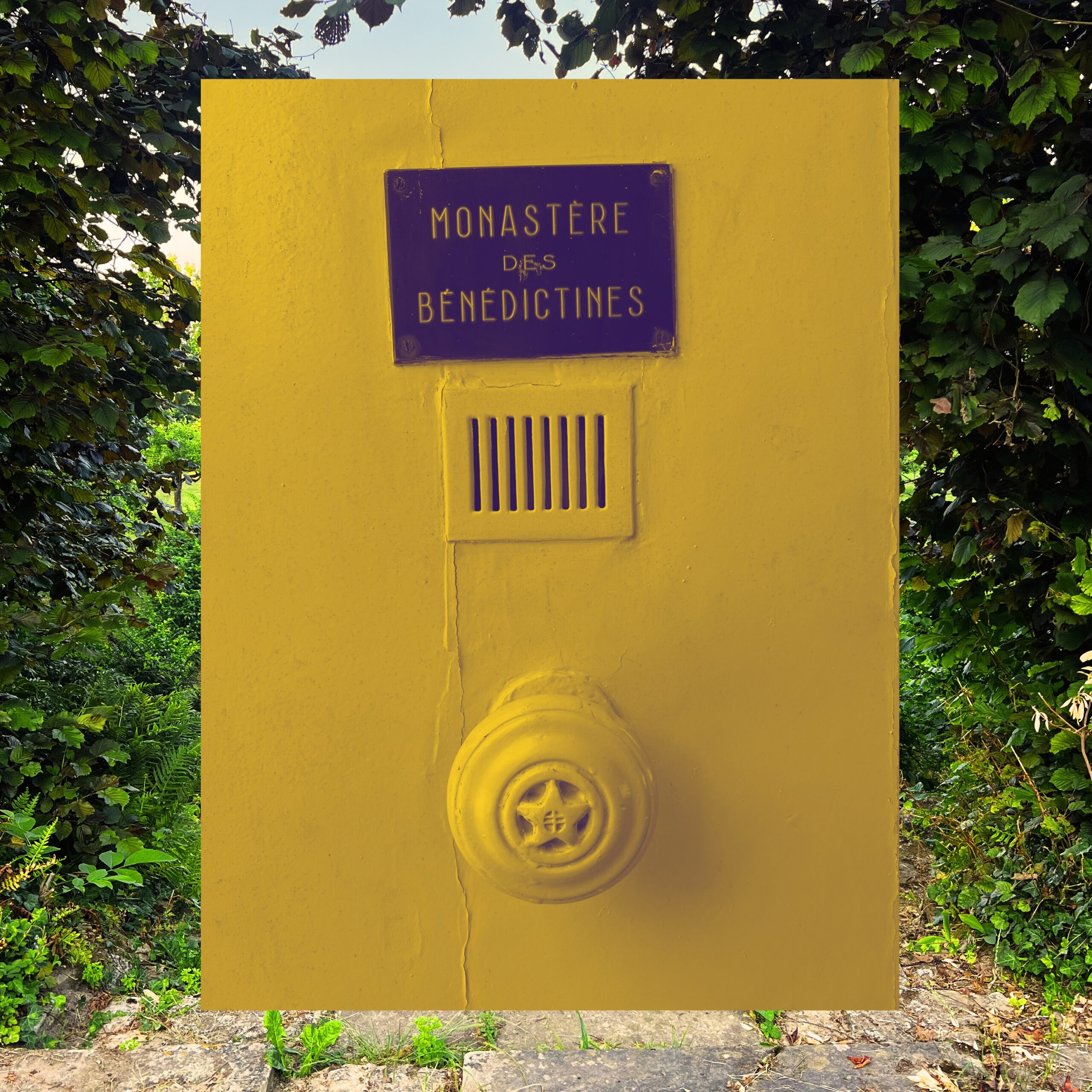June 20 // transcendent pastries and hypothetical bubbles
Finally, in a blog that was intended to be booze-themed, we have arrived in not only the first truly notable Booze Region™ to date, but arguably the most renowned Booze Region® on this godforsaken planet.
Welcome to Champagne Country, eyeball owners, where the land is so expensive that it costs around $10 in grapes alone to produce each bottle (pre-tariff)!
We’ve ridden just over 30 miles to get here on this particularly sweltering Friday, with the majority of our 900-foot climb to the Monastery of Saint-Thierry reserved for the final stretch.
Unlike Laon, there are no ramparts in this village, no obvious lines of defense against Huns or Vandals: as if from those extra few meters in altitude, the sepia-toned wheat fields are suddenly stained by a deep, almost otherworldly green of vines in ivy and grape.
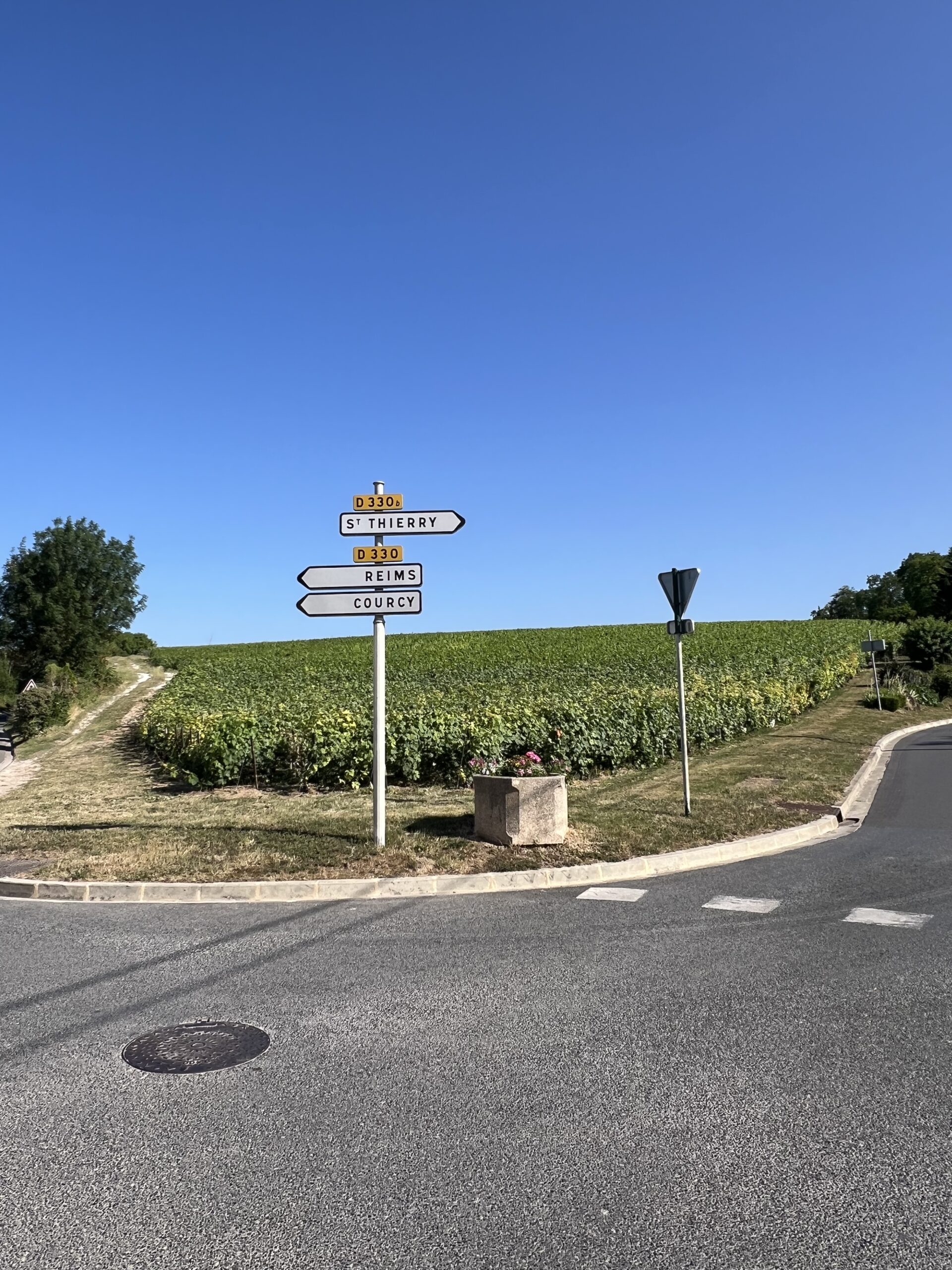
As usual, Mark is miles ahead. Dizzy from temperatures easily exceeding 90°, I lean against my handlebars, pushing my pedals with whatever remaining strength I have left, taking comfort in knowing that I have only a few feet to go to reach that great gray stone apse up ahead, except shit, that’s village church, not the monastery.
Once the half-melted bitumen road begins to mercifully flatten out, I’m surrounded by a ghost town of crude, pale stone apartments — as opposed to the uniform, industrial red brick that had been so common over the last week — adorned with typical “French” shutters, all of which are shut against the heat.
Saint-Thierry looks more like a storybook French village than just about any other French village we’ve seen thus far, with little more than pharmacy and a patisserie twinned together on one side of the street.
On the other, a small rectangle of square provides a non-existent public with a non-operational stone fountain and two shady benches fringed by hedgerows and a few balding rosebushes.
This must be the Monastère, I decide. And even if it isn’t, I’m still sleeping here.
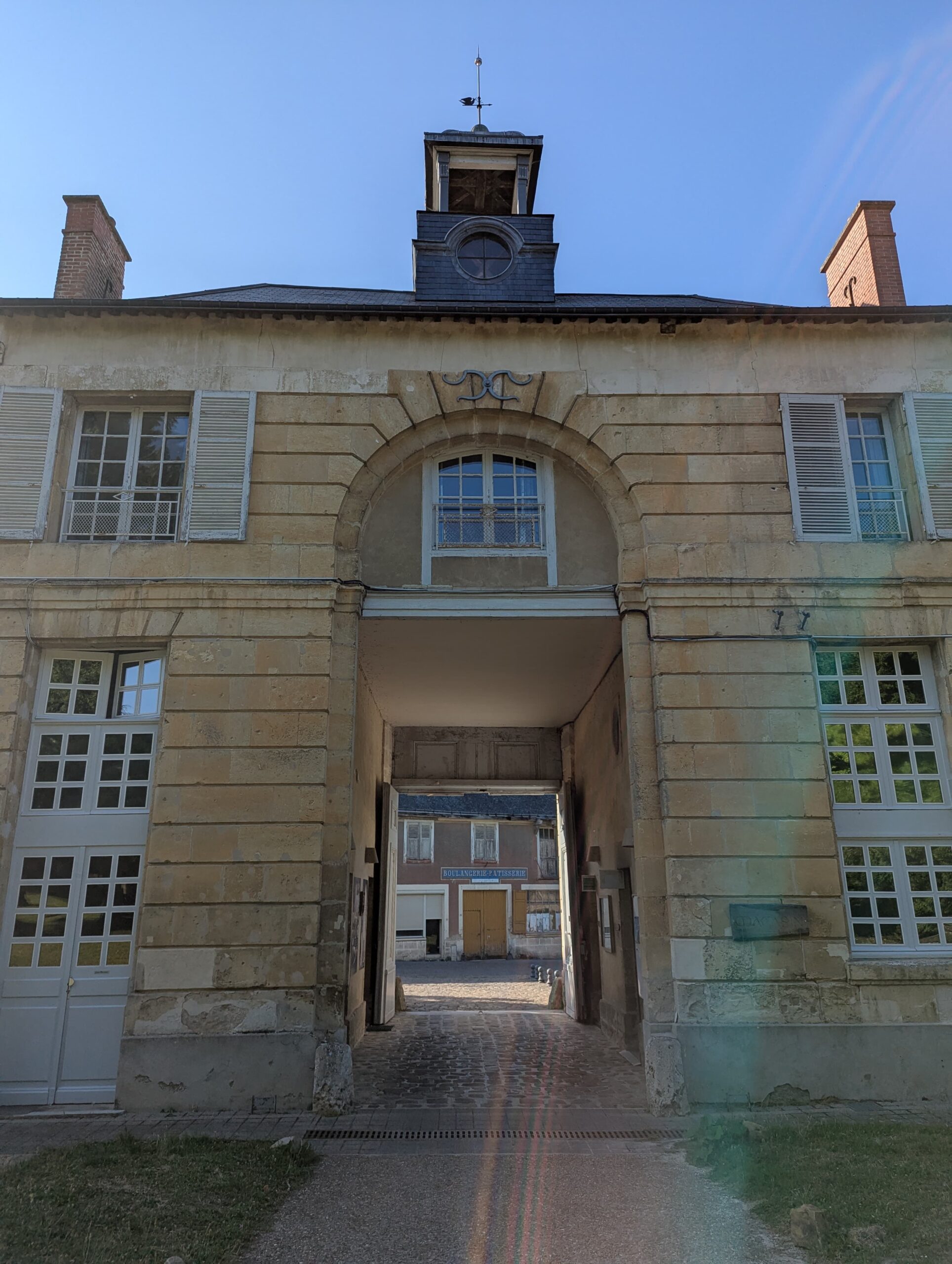
Sure enough, under a modestly monumental abbey gate in patched yellow stone and topped with a triptych of windows (through which, one assumes, the village’s version of Quasimodo watches the passersby), I find Mark and Markbike each leaning against the crumbling wall, each showing the same measure of relief to see that I’ve made it intact.
“It’s hot,” I say, struggling to catch my breath.
“Yep,” he responds, and I follow him in through the open gateway, finally finding some shade.
Conveniently enough for this narrative, there’s a poster on the tunnel wall that offers up a bit of history: with roots dating back to the start of the 6th century, the Benedictines who founded the place got the boot during the Napoleonic era, as was so common throughout the country back then, and most of the abbey was burnt to the ground in 1777.
Only in 1968 was it reinhabited (my word, not theirs) by the Benedictines of St-Bathilde, who remain here to this day, providing for themselves through the production of textiles or musical instruments or to be honest, I’m too tired to give a shit.
There’s a gift shop on the left, presumably where such things are typically peddled, but it’s shuttered; there’s a real-life nun waiting in the adjacent office, however, and she’s dressed in a perfectly pressed powder-blue habit.
She must be 120 years old, I figure, with eyes cloudy and skin as translucent as quartz, smiling vaguely into the abyss, completely unaware of our presence.
We need to check in to claim our reservation before all the other pilgrim beds are claimed. But how? Can men be in the same room as nuns? Are we allowed to speak to them, or do we need to communicate through an intermediary? Is there official Nun Protocol, or is every convent different? Do I need to tell them I’m Jewish? Mark, technically a Catholic, can only shrug.
Covering my spandex bulge with my hat, I cross the threshold to find out. As if activated by a token, she turn her focus on me, her smile growing to a grin. There’s a calm and contentedness in the room so palpable, so profound, that it sends shivers down my spine.
Flailing and apologizing and apologizing and flailing, I do my best to explain that we’d booked two beds for the night, that we’re tired, and that we’d like to check in. She laughs at me, then picks up the phone, dialing at the kind of pace we saw when that monk tried to operate a credit card machine back in Wisques. “Attendez, s’il vous plaît,” she says, then returns to her thousand-kilometer grin.
After a few minutes of attendezing, an exponentially younger, bespectacled nun eases her wheelchair in through the side door. The elder nun eases herself onto her creaky, ancient feet, ceding the shift to her habit mate, who inherits the silence quite dutifully.
I enter the office once again, trying to explain why two half-naked men are clogging up her hallway, and she calmly say “patience, patience.” Patience?! What the fuck! Where is the manager? Where is the WiFi? I need to check my Fantasy Baseball Team and I need to claim my room and I need to shower and I need to drink and I need to do it now!
Nevertheless, I wade in such worry for what feels like an hour in the hanging heat of the entryway, nearly choking on the sheer awkwardness of this whole dynamic. Needing something else to focus on, I waste the last of my water trying to purge the crystals of dried sweat from my cycling hat. “Champagne,” I say to Mark.
“Yep,” he responds.
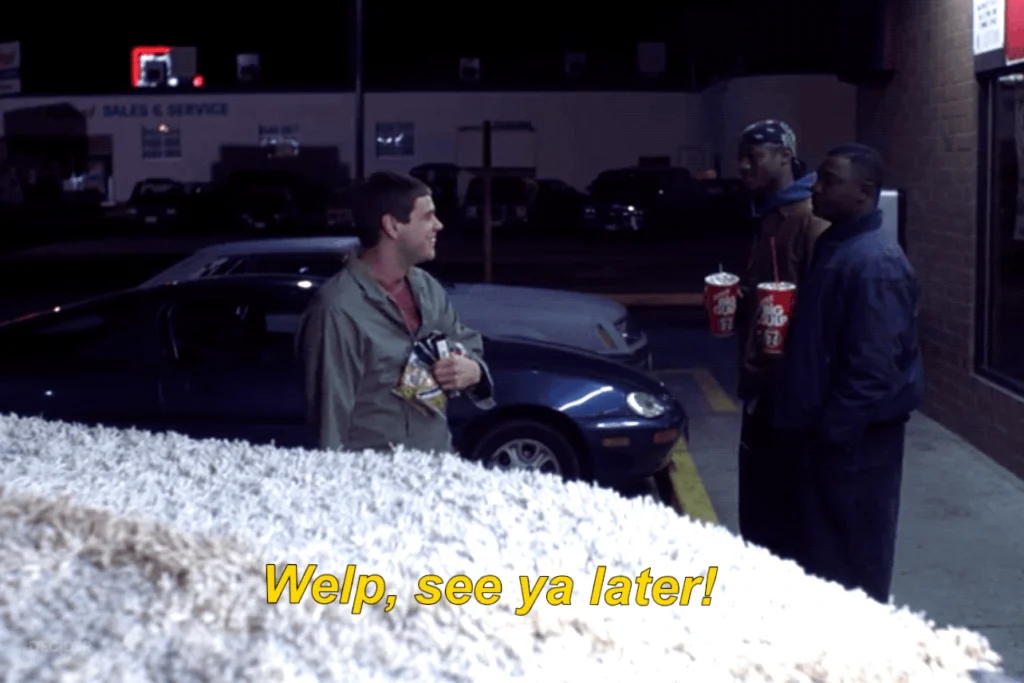
At long last, our hostess, Sister Laurence, pokes her head in from the courtyard without the slightest smirk. “Thank you for your…patience,” she quips (though as what might be the first non-Mark English I’ve heard in weeks, perhaps I’m now inclined to assume all English is sarcastic).
Dressed in civilian clothes, Sister Laurence beckons us to follow her, wasting not another word as we pass through the gateway and onto the monastery grounds.
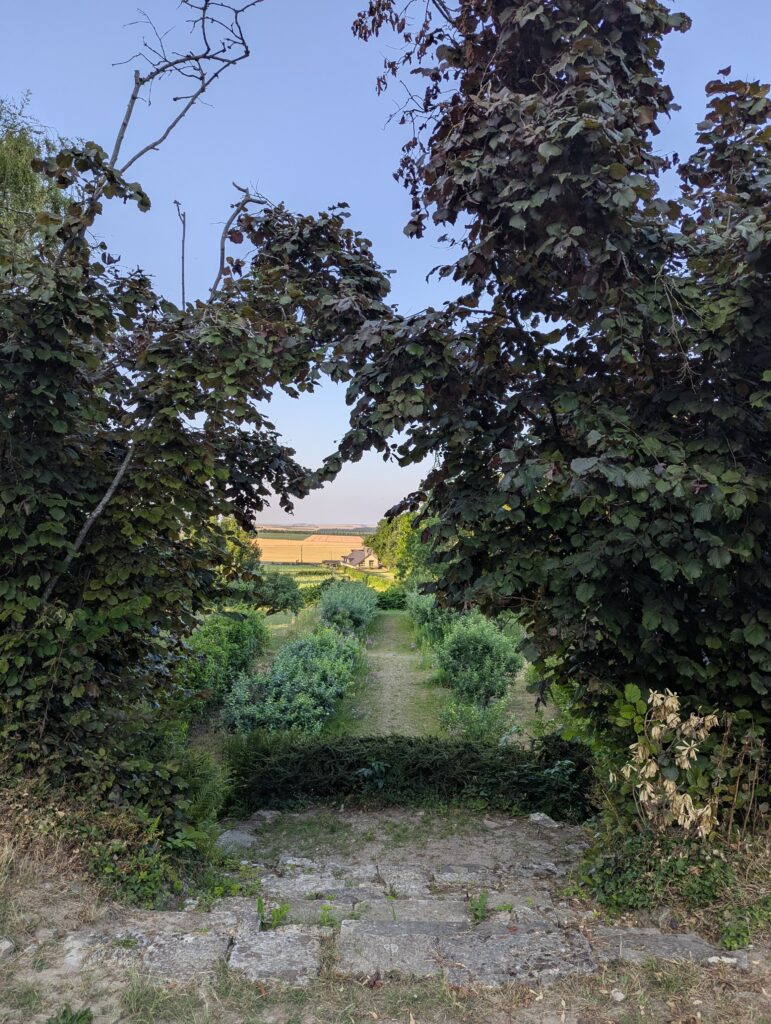
As with our first experience at a French abbey, this one lends the impression that we’ve leapt through time, with the added trick of having somehow squeezed a vast, manicured forest behind that decaying edifice. Mathematically speaking, how did they import this garden and that view, so lush and stuffed and stretched to the horizon? Where were those vineyards and villages on the ride over? Am I still me? And why am I suddenly craving human flesh?
Other than the crunch of our footsteps on loose gravel, there is a quiet here so extreme that I have to ask Sister Laurence in the tiniest whisper if, perhaps, there might be an obligatory vow of silence while on the grounds…? “Yes,” she bellows out, harvesting a mild chuckle from the confusion on my face.
Landing in her office, we find ourselves back to the future, to an era of manila folders and post-its and all the chaotic dullness I’d thought I’d left at home.
A cell phone buzzes from within a drawer. “Sorry, it’s my husband,” Sister L says, hopping on the call as she stamps our pilgrim passports. Seriously, am I going crazy? Since when do nuns have cell phones? And Rolodexes? Since when do nuns have husbands?!
After we pay an absurd €20 each for a private bed, breakfast and dinner included, Sister Laurence stresses that we have around two hours until dinner is served and the monastery gates are locked for the night. This noted, we lock our bikes and belongings in a storage closet, sniff out the pillow situation in our room, and after a quick S&S1 in a bathroom lacking in functioning lights, I feel restored and ready, finally, for some of that fabled fizzy juice.
Now all we have to do is find a winery.
At the village patisserie, Au Fournil du Massif, I ask the freckled cashier where she might recommend. “Oh, I don’t drink that,” she says, blushing.
Maybe the plump, red-cheeked woman in line behind us will know. “Hmm. There is a Route de Champagne here that is very famous,” the woman says, gesturing broadly around the bend. “But I don’t know. I don’t drink that, either.”
Great. Does anyone in Champagne drink champagne?!
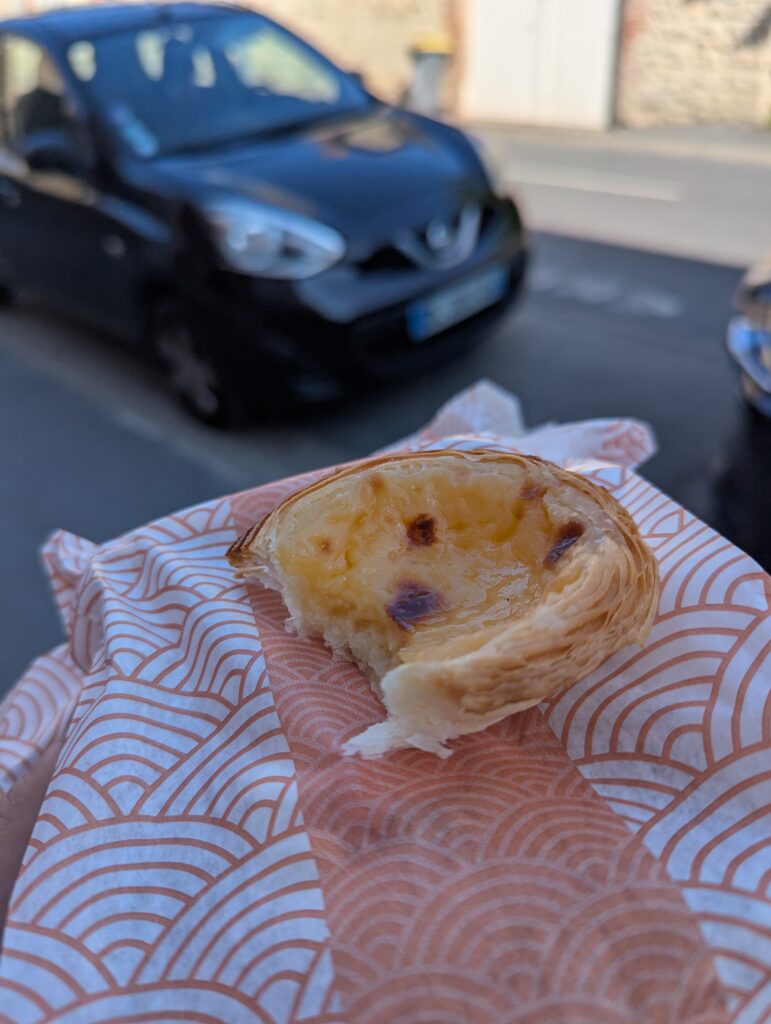
To stave off the roaring in my stomach, we settle for a bottle of eau and few snacks. I get a palm-sized St. Honoré2 (a type of choux pastry filled with fresh cream and topped, in this case, with a chocolate disc and fresh strawberries), plus a Pastel de Nata (a Portuguese custard tart) for good measure. And for a moment, literally a moment, all the pain, thirst, and disappointment dissipates.
Until we step out onto a highway, anyway. Waddling up the small hill, legs aching from both sun-seared skin and ever-acidified muscles, it becomes clear just how different the weather plays on foot. Much to my surprise, I find myself missing my bike.
Within a mile, we spot our first winery, then another: both are closed. Another click or so up the hill, we find an open garage full of bottles, but the bleary-eyed blonde man waves us away.
Out in the industrial town of Pouillon, we find only one active tasting room among its warehouses, where an old lady coaxes her son from his office with a shout. “Hey Tyrone! Get down here, you piece of shit!”
Tyrone offers to sell us an unrefrigerated bottle to go for €50, as if it were some great inconvenience to him, but fuck him and fuck this town: we’ve got the whole Champagne region left to bike though, after all.
Back on the monastery grounds a few pounds lighter in water weight and with few minutes to spare, we find a flock of nuns out for a stroll in the courtyard, seemingly lost in thought. “Ask them if we can take a picture with them,” Mark whispers.
“Mark, they’re not…isn’t that, like, tokenizing them?” I say, trailing off as they approach us. “Bon soir, sœurs,” I offer, smiling like a doofus.
The group giggles, and our friend in the wheelchair rolls to the front of the pack, holding out her phone. “Une foto?”
With rare effusion, my friend kneels at the center of the group. “No, Mark, I think they mean of them,” but they wave me off and crowd around him. It’s hard enough, just interacting with normal women, but with nuns—and in another language!—it’s all just too much.
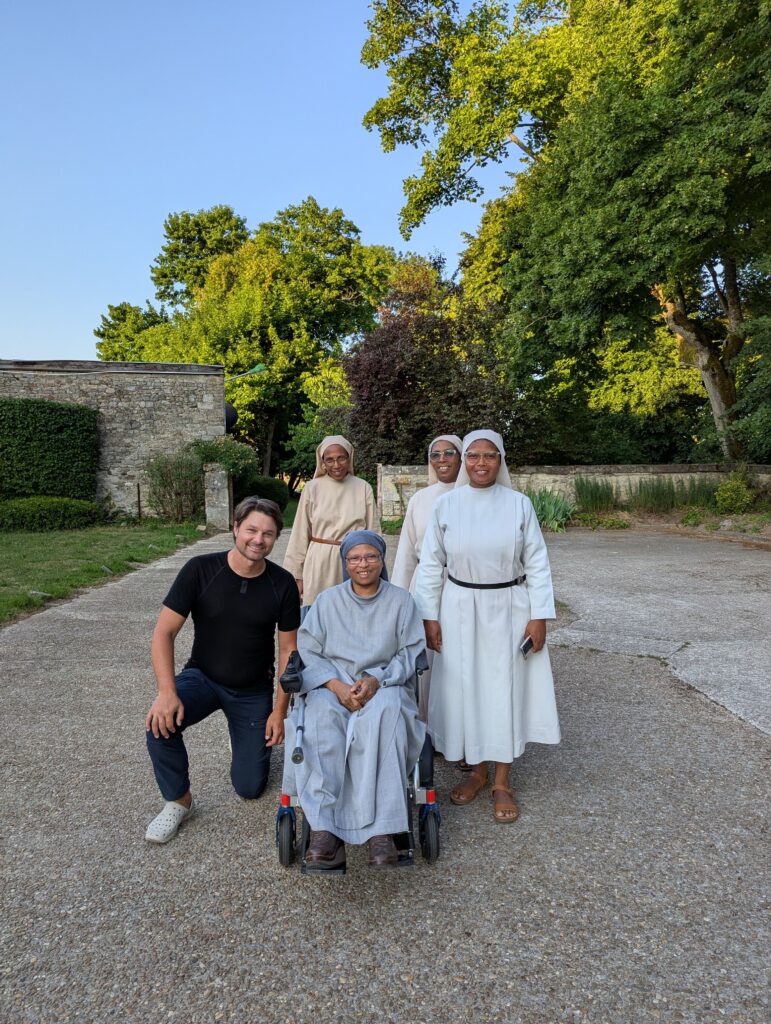
“Eric, just take the goddamned picture.”
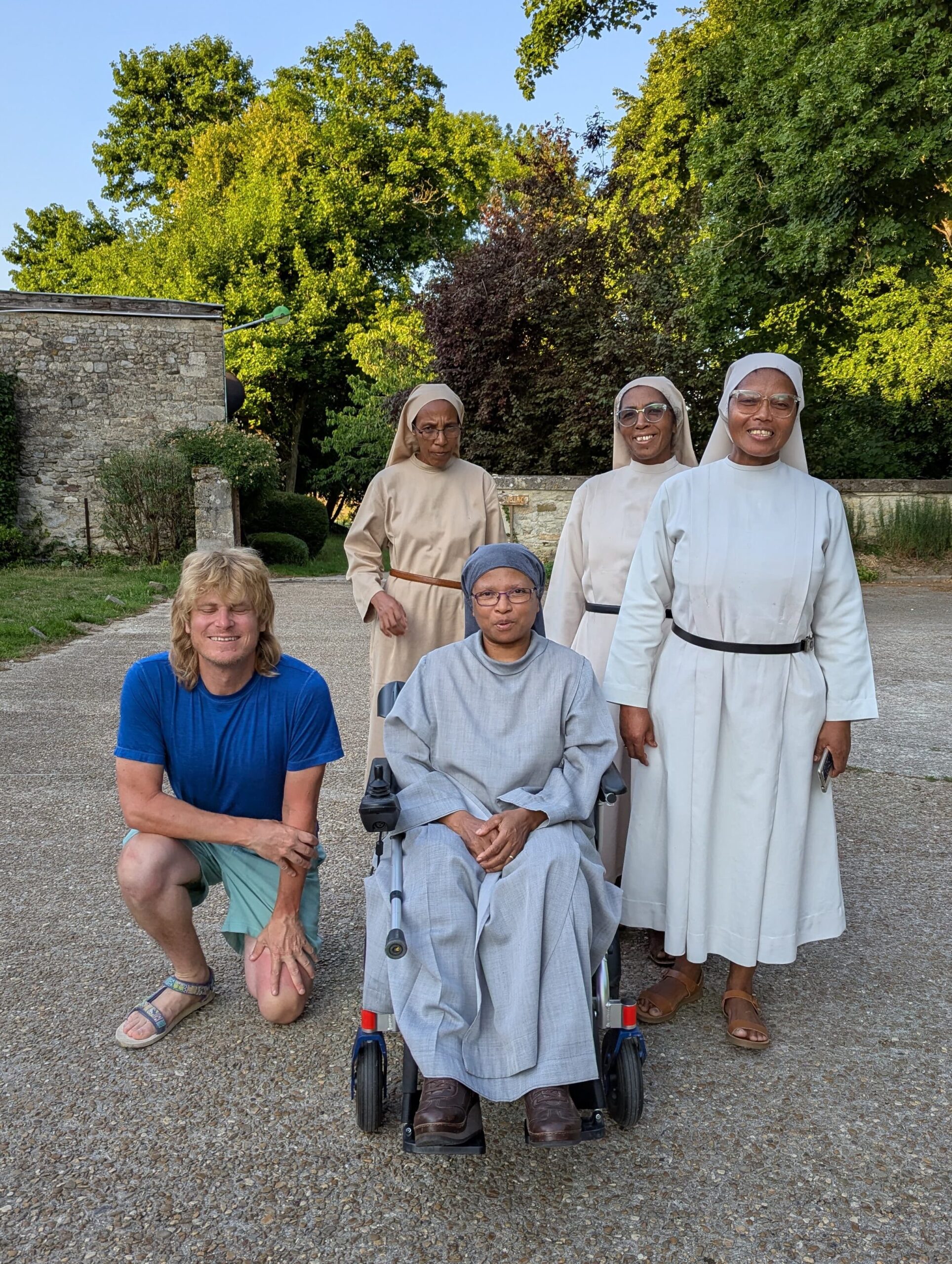
“I’ve always dreamed of going to America,” the youngest and smiliest whispers in my ear, and I do my best not to spoil the moment with yet another political diatribe. These sisters travel the world from one monastery to another on a temporary, mid-term basis, each just happening to hail from Madagascar, and that’s just about as deep into it as they’re willing to go.
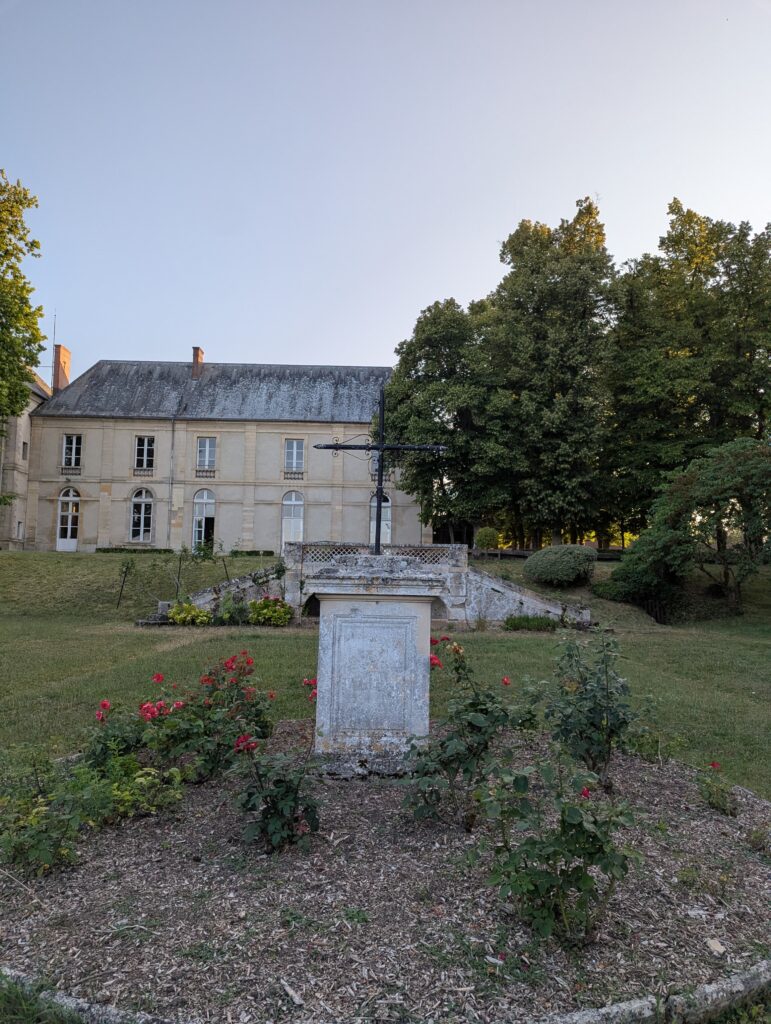
Mark and I take the opportunity to admire the sunset from atop the mossy ruins of a staircase that must date back several hundred years, when a voice punctures our reflection.
“Hey! Allo!” Back by a fenced-in clearing in between our lodgings with what I presume to be the sisters’ cloister, an older man in a billowing flannel shirt waves us over. “I am Benoît,” he says, patting himself in the chest. “Like Saint Benedict, as you say in English. Come.”
From the latter building, where a nun hands us each a chafing dish, we follow the man through a labyrinthine series of doors to a small, wood-paneled dining room/storage space in “our” building.
As soon as we finish setting the dinner table, I slam two glasses of tap water, and Benoît presents us with a tall bottle of rustic Normandy cider. “You want?”
Mark and I exchange a look. Umm.

Cork popped, glasses filled, glasses downed, glasses filled again, Benoît ladles out bowls of chilled, celery-green Vichyssoise, then bows his head for a moment’s prayer. I effectively chug down the soup along with another two glasses of water, kill the jug, refill it, and proceed to down another glass. “Jesus,” Mark says, pouring himself a glass before I can finish it off again.
Speaking of Jesus, Benoît is blissfully retired theology teacher (and occasional English tutor). Living, like, thirty minutes away from the monastery, he abandons his wife on most weekends to pass his time here in prayer.
Benoît is kinetic and loud, and as much as I love it when people try to convert me or force me into prayer, he never even verges on proselytization. Instead, he leans into our every word with great interest, charging the conversation with a passion so powerful that even Mark gets pulled into the action.
“You live in Sacramento! Mark, I have been to Sacramento! My dear friend Deidre is from there, and I visited her family! In Sacramento! Do you know the Honnolds?”
Mark nearly chokes in surprise. “I do. Or at least I used to see her son at the gym sometimes.”
“Alex3! A very good boy. Very good!”
Collecting our bowls, Benoît then peels back the foil on a chafing dish to reveal our main course, unleashing the unmistakable perfume of offal.
There must be enough stew in here to serve at least 20 people, enough livers to sustain at least 10 calves. I heap out extra-large servings as Benoît manifests a bottle of rosé. “No?”
“Yes,” we say, probably in unison.
As they continue to discuss the dream of Sacramento, I study Benoît’s face, finding my late grandfather in his course gray hair, and his olive-colored skin, and even in his glasses. When Benoît’s eyes grow wide and wild with laughter, I find myself wondering: What if Grandpa had this resource? What if, whenever he found things to be too much, he could retreat into reflection in the countryside, or find commonalities with intergenerational strangers over dinner? Would it have lightened the weight he’d carried with him for most of his life? How can I apply this to my own —
Wait. I’m going to shit my pants.
Back from the bathroom with all intact, I find the two of them laughing like old friends; Benoît sheepishly asks for Mark’s email address, and to my surprise, Mark shares it.
We share a few hunks of cheese for dessert, even if my bladder is still bursting with water, my liver with wine, my stomach with liver, and once we’re done washing our dishes, the old man retreats to his room to close out the night in prayer.
Back in our own quarters, it dawns on me that we have the entire floor to ourselves, if not the entire building. After one last “nightcap” in the tar-dark latrine, I hover for a moment in the hallway.
Alone in my underwear quite Quasimodically, looking out onto the street, to the patisserie, the pharmacy, and the rectangular square from the very window I had been inspecting earlier in the day.
What a sensation, being so exposed to this world that didn’t know me then, and couldn’t possibly know how much I’ve changed over the course of just a few hours. Once a boy who grumbled so vainly about the heat of the day, now a shivering adult with nothing to hide, just a man in his underwear surrounded by ghosts who probably don’t drink champagne, either.
- Should you be unaware, this translates roughly to “Shower ‘n Shit” in our remarkably efficient, highly evolved parlance. ↩︎
- One of the most high-profile desserts to come from 19th century Paris, the cake is named after the patron saint of pastry chefs, a 5th century bishop from Amiens which, coincidentally, is located in the Somme just a few clicks west of that fortress we visited in Péronne. ↩︎
- Alex, I learn later, is the Alex Honnold, the protagonist in the Academy Award-winning Free Solo and one of the most notoriously daring climbers in history. ↩︎

